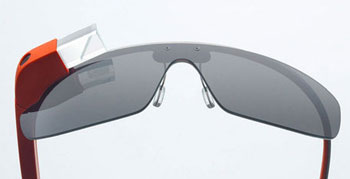Do you mind if I record you reading this article? Chances are, if you’re reading this on screen, there’s a webcam in your PC or laptop or mobile phone that could be hacked and track what you’re doing. Hackers do this all the time. Digital etiquette, however, makes such invasive technology impossible. Or so you thought. That vision of a future of constant surveillance is the one raised by Google Glass, the wearable computer that Google hopes we’ll all be wearing like glasses. Glass comprises a tiny camera, a microphone and a screen. Our every sight will be augmented with extra information, and everything can be recorded.

It’s clear that the futuristic headgear will be banned in places that ban cameras. But what about everyday places?
To make it less of a social stigma Google boss Eric Schmidt in an interview with the BBC calls for a “new social etiquette” to govern their use:
In general these kinds of bodywear devices, of which this is an example, will bring in a whole bunch of (…) concerns. And the fact of the matter is that we’ll have to develop some new social etiquette. It’s obviously not appropriate to wear these glasses in situations where recording is not correct. And indeed you have this problem already with phones.
And cameras and sometimes photographers.
Glass cameras with always-on live view are highly intrusive and not everywhere appropriate, and especially the recording of images in public places has since long become an issue that touches on everyone’s basic rights. Why shouldn’t it be allowed to snap playing children? Gosh you might be a pedophile! Why no photos allowed of this or that building? Security.
I remember when I was a boy and taking a plane with my parents I was always allowed in the cockpit and talk to the captain and copilot. Today they’re barricaded behind reinforced doors.
The loss of access and rights has a common root: the abuse of access and rights. If everyone would behave we’d still be traveling to Afghanistan and everyone could greet the pilot. But even paradise wasn’t this kind of perfect. Look, even there they succumbed to temptation when given the choice.
Google Glass is a very double-edged sword that will bring many new temptations. Like when we first had cell phones, we had to learn to define rules that we now take for granted, such as not answering a call during dinner.
Some people already anticipate the new social norms that we’ll have to develop when everyone’s wearing a camera. They create a Glass code of conduct. Well the Glass camera could be on live and without anyone being told or noticing. That, in turn, can make people very exploitable. Some Googlers — or should I call them Glassers — will be tempted to use it in occasions when others insist on absolute privacy — which causes paranoia and calls for even more laws and privacy.

Google seems to be thinking quite carefully about how they design Glass because this new technology raises a whole lot of new issues. While testing Glass, developers came up with ways to show others that they are fully involved in a conversation, or to reassure someone of confidentiality.
One move is dubbed “the Californian” and it involves sliding Glass to the top of one’s head, like a headband or pair of sunglasses. Another is called “the LeBeau” — presumably after Mike LeBeau, an engineer working on Project Glass, and it consists of switching Glass off and draping it across the back of your neck, with the display and camera pointing behind you.
There are practical concerns, too: Glass during a pub quiz would be cheating. Glass at your local swimming pool would be somewhere between impertinent and illegal. But what about at work, where some might think that such technology keeps employees on their best behavior? Or out on the street where maps might help? Let’s not even consider a public toilet.
In truth, we are already under surveillance a lot more than we notice, by CCTV, by people casually recording things on their mobiles anyway, by software used in the workplace that logs when you’re at your computer. But none of these is quite the same: Glass uses an imaging technology that will only become more discrete, invisible almost.
We’ll have to get used to personalized constant surveillance. Many will even love this sort of voyeurism in a digital age when more and more people seem to share everything online.
Glass will make us become even more transparent citizens and thanks to its omnipresent camera we’ll see things we’d never imagined to witness. We’ll see more accidents, more betrayals, but also more beauty and more of everything that drives the human condition.
Honestly, I’m looking forward to this spectacle camera. Releasing the shutter button by the movement of the eyebrow or a twinkle in one’s eye, just imagine.
No more OVF vs. EVF vs. rangefinder debate. The whole thing sits on the tip of your nose and is operated by voice command and gestures.
So next time someone winks at you, smile back, you’re recorded.


